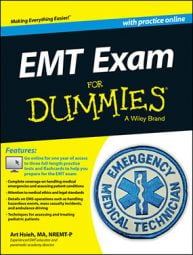Franklin Roosevelt once said, “The only thing we have to fear is fear itself.” Many students come to fear the EMT exam, having heard rumors about how difficult it is and how after the test is over, you don’t know how it went. Put those concerns aside and approach the exam like any other challenge — plan for it, work for it, and go for it.
Have the right mindset
The design of the NREMT exam makes it feel difficult no matter how prepared you are. Computer adaptive testing adjusts the level of difficulty for each question based on your performance on the previous one. The more you answer correctly, the harder the questions become until you reach a level that’s above the minimum standard. So, don’t stress about what you’ve heard.
Be aware that the test will feel difficult. If your study habits are solid and you dedicate your efforts toward passing the exam, you’ll do just fine. Confidence quells any fear you may have about not remembering all the information.
But what happens if you don’t do well on exam day? You simply retake the exam. Even the NREMT recognizes that anyone can have an “off” day. In fact, you can retake the exam up to six times before you’re required to retake an EMT course. So, don’t panic if you don’t pass the first time — you can try again after doing some additional preparation.
Make a few final plans before exam day
The NREMT exam is like a sports game, such as baseball or football. Sure, you can just play in a pickup game and have great fun. But if you’re competing in a league, placing first takes practice, preparation, and determination. So it is for the exam. You want to be at your best on “game day”!
Pick an optimal time to take the exam. You know yourself best — pick a time that you know you’ll be most awake, alert, and ready to test. Most testing centers have appointments that begin first thing in the morning, in the evening, and on weekends. Choose the best time slot for you; then clear your schedule of other tasks that day so you’re sure to make your appointment.
Get enough rest. Scientific studies have made it clear that a well-rested brain is needed to think through exam questions. Please, don’t try to cram your studies into the last 24 hours. Doing so isn’t likely to help and will just make you tired.
Don’t sacrifice exercise. Physical exercise can help clear the brain of cobwebs and reduce the stress built up within the body. Go for a run or take a time-out at the gym — your brain and body will thank you.

